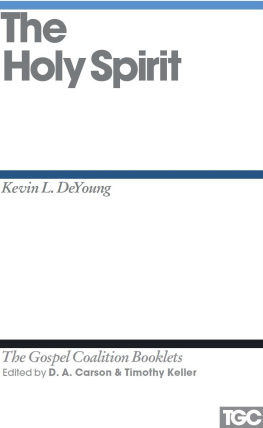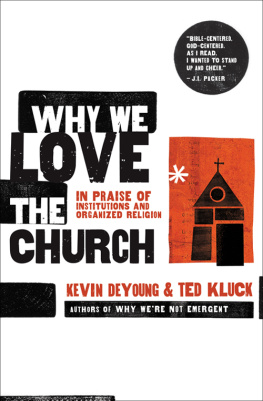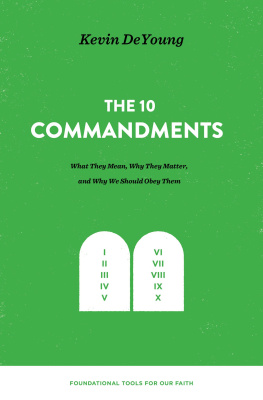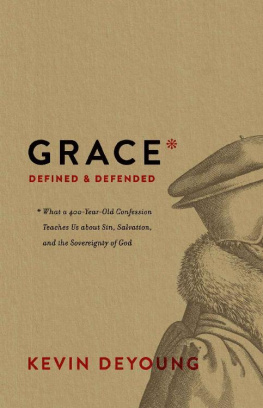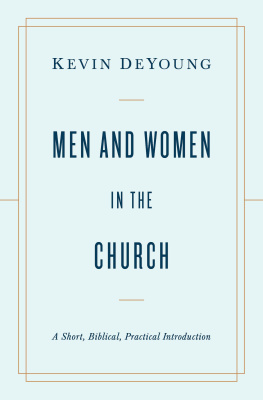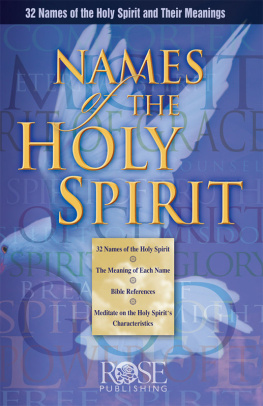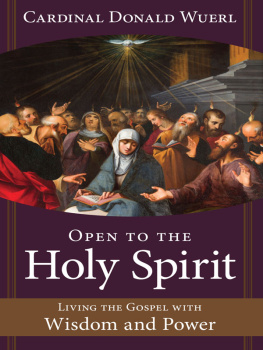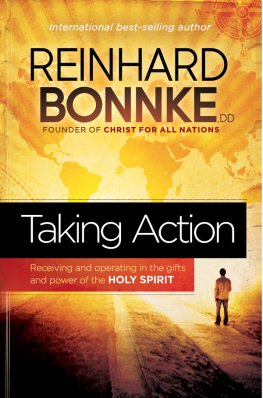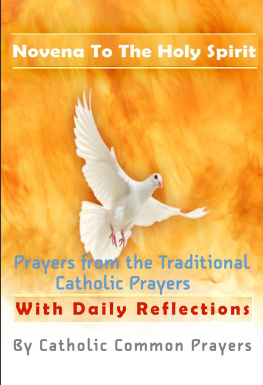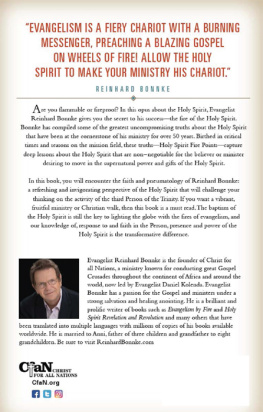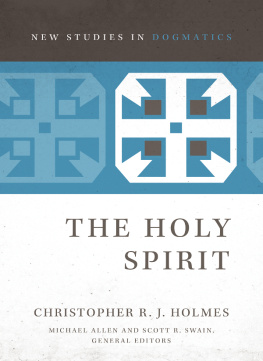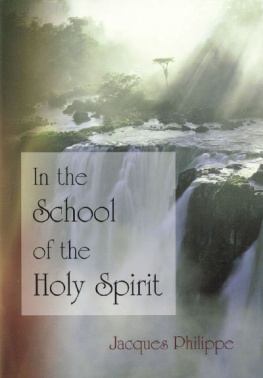The Holy Spirit
The Gospel Coalition Booklets
Edited by D. A. Carson & Timothy Keller
Gospel-Centered Ministry by D. A. Carson and Timothy Keller
The Restoration of All Things by Sam Storms
The Church: Gods New People by Tim Savage
Creation by Andrew M. Davis
Can We Know the Truth? by Richard D. Phillips
What Is the Gospel? by Bryan Chapell
The Plan by Colin S. Smith
The Holy Spirit
Copyright 2011 by The Gospel Coalition
Published by Crossway
1300 Crescent Street
Wheaton, Illinois 60187
All rights reserved. No part of this publication may be reproduced, stored in a retrieval system, or transmitted in any form by any means, electronic, mechanical, photocopy, recording, or otherwise, without the prior permission of the publisher, except as provided for by USA copyright law.
Cover design: Matthew Wahl
First printing 2011
Printed in the United States of America
Scripture quotations are from the ESV Bible (The Holy Bible, English Standard Version), copyright 2001 by Crossway. Used by permission. All rights reserved.
Trade paperback ISBN: 978-1-4335-2767-8
PDF ISBN: 978-1-4335-2768-5
Mobipocket ISBN: 978-1-4335-2769-2
ePub ISBN: 978-1-4335-2770-8
| Crossway is a publishing ministry of Good News Publishers. |
VP 20 19 18 17 16 15 14 13 12 11
14 13 12 11 10 9 8 7 6 5 4 3 2 1
Contents
L ets be honest: one of the fun things about Christmas is getting presents. Some people get very few, some get too many. But most people get something. This past year I got some books (yay), clothes (meh), a Nintendo Wii (it was, er, for the kids), and a John Calvin bobblehead doll (priceless). All in all, a decent haul.
Think about your favorite gift, not just from Christmas, but the best ever. Its hard to beat an engagement ring for long-term impact. But what if I told you of a gift that provided a surer, longer-lasting promise than marriage? Money might be your favorite. After all, you can wield a lot of influence and do a lot of fun things with money. But what if I told you of a gift that provided more life-changing power, more world-transforming influence, than wealth? Maybe you are the sentimental type and your most treasured gifts are old photographs given by friends and family. Well, what if I you told of a gift that provided more than a picture of your beloved; it gave you his very presence with you for all time?
This would be some gifta gift of promise, of power, of presence. And millions all around the world have received it. Or received him, I should say. For the gift, as you may have guessed, is the Holy Spirit. No other possession is as precious, helpful, dynamic, strong, and loving as the Spirit who dwells in those who belong to God through Christ (1 Cor. 3:16).
The word for spirit is ruach in Hebrew and pneuma in Greek. The former is used roughly ninety times for the Holy Spirit in the Old Testament. The latter is employed more than 250 times as a reference to the Spirit in the New Testament. Both words can refer to wind or breath. The general idea is the same: ruach and pneuma express energy, motion, life, activity. The Holy Spirit is the Spirit set apart, belonging to God. He is Gods power and presence among his people.
The Holy Spirit, though more visible in the New Testament, was also at work in the Old. He was present at creation, hovering over the face of the waters, poised to order and complete what the Father had purposed and planned (Gen. 1:2). The Holy Spirit was instrumental in the exodus (Isa. 64:714). He gifted Gods people for service, equipping Bezalel and Oholiab not just with artistic excellence but with the Spirits power to reshape a kind of heaven on earth (Ex. 35:3035). We see frequently how the Spirit in the Old Testament rested on individuals like Balaam, Gideon, Jephthah, Samson, and Azariah for special acts of speaking or acting (Num. 24:2; Judges 6:34; 11:29; 13:25; 14:6, 19; 15:14; 2 Chron. 15:1). The Spirit could also come on people for a time and then depart, as Saul experienced (1 Sam. 16:14) and David feared (Ps. 51:11).
The Spirits activity in the Old Testament is powerful but less than complete. Its no surprise, then, that the Old Testament looks forward to a coming age of the Spirit. Three prophecies in particular predict the glory of this new day. Joel 2:2832 looks forward to the Spirits coming upon all Gods people. Ezekiel 36:2237:14 awaits the day when the Spirit will dwell within Gods people personally and permanently. And Isaiah 11:15 promises a Spirit-anointed Branch from the root of Jesse who will usher in the day of salvation for Israel. A universal Spirit, an indwelling Spirit, and a Spirit-empowered Savior: this is the age of the Spirit the Old Testament anticipates. Under the new covenant, this outpouring is realized (2 Cor. 3:111). The Spirit is poured out on all flesh (Acts 2:1421), indwells all believers (Rom. 8:9), and empowers and glorifies the Spirit-anointed Messiah in his earthly ministry and saving work.
The New Testament emphasizes that last point more than we often realize. The Spirit empowered the Son through every stage of his ministry. The Holy Spirit overshadowed Mary in the virginal conception (Matt. 1:18, 20; Luke 1:35). The Holy Spirit was upon Simeon when he spoke about Jesus in the temple (Luke 2:25). The Spirit rested on Jesus at his baptism (Matt. 3:16). Then the Spirit led Jesus, who Luke says was full of the Holy Spirit, into the wilderness to be tempted by the Devil (Matt. 4:1; Luke 4:1). After the temptation, Jesus returned to Galilee in the power of the Spirit (4:14) and announced in the synagogue that the Spirit of the Lord was upon him to proclaim the good news to the poor (4:18).
It was by the Spirit of God that Jesus cast out demons (Matt. 12:28). Hebrews 9:14 says it was through the eternal Spirit that Christ offered himself as a sacrifice to God. According to Romans 1:4, Jesus was declared with power to be the Son of God by his resurrection from the dead through the Spirit of holiness. From conception to birth through life, ministry, death, and resurrection, the Spirit was at work upon and through Christ.
A Person
The Holy Spirit is a person. He grieves (Eph. 4:30); intercedes (Rom. 8:2627); testifies (John 16:1215); speaks (Mark 13:11); creates (Gen. 1:2; Luke 1:35); has a mind (Rom. 8:27); and can be blasphemed (Mark 3:2829). (Of course, the Scriptures are also said to testify and speak, and no one thinks the Scriptures are human. Yet context shows in such cases that this is a personification of Scripture, signaling, in fact, that God speaks and testifies through the Scriptures.) In the Farewell Discourse (John 1416), Jesus promises to send another parakletos [variously rendered helper, counselor, advocate], namely, the Holy Spirit, who is Jesus successor in earthly ministry and in some respects Jesus replacement, and an impersonal force or the like simply will not fit the descriptions of what Jesus bequeathed Spirit will do.
God
The Holy Spirit is not just a person; he is a divine person. Psalm 139:7 hints at his omnipresence. He is the eternal Spirit (Heb. 9:14). Lying to the Holy Spirit is the same as lying to God (Acts 5:34). Paul uses the phrase Gods temple interchangeably with temple of the Holy Spirit, thus equating the two (1 Cor. 3:16; 6:19).

